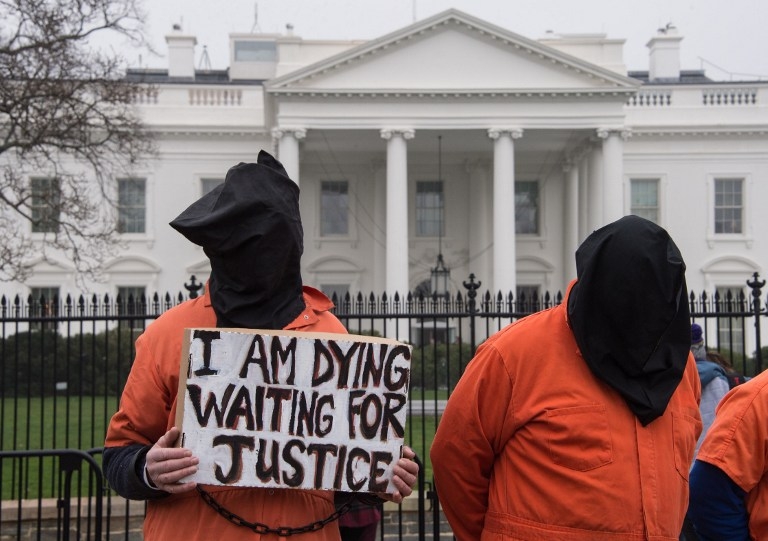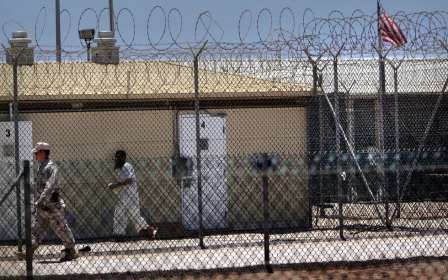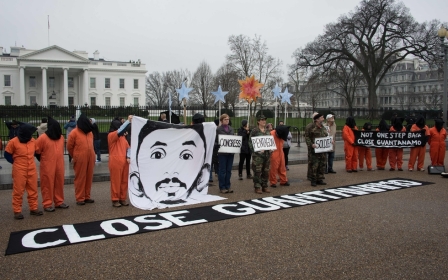Saudi released as Guantanamo protesters mark 14 years of detentions

A Saudi Arabian man imprisoned for 14 years in Guantanamo Bay has been repatriated, the US defence department said in a statement on Monday.
Muhammed Abd al-Rahman Awn al-Shamrani's return to his homeland, which coincides with the 14th anniversary of the opening of the US military prison for inmates from the so-called "War on Terror", means there are now 103 remaining.
Protesters planned to demonstrate outside the White House in Washington on Monday to call on US President Barack Obama to make good on his promise on coming to office in 2009 to close the prison, located on a US military base in Cuba.
“One day, let alone 14 years, is too long for the US to imprison 100 men at Guantanamo without charge or trial. For seven years the president has promised to close this prison – a blemish on our nation’s commitment to the rule of law – yet the situation has not improved," said Nihad Awad, national executive director of the Council on American-Islamic Relations which was among the civil liberties and human rights group backing the protest.
"We are responsible for safeguarding the constitutional values which are meant to protect all Americans, persons who reside in the US, and those in our custody from the abuses of indefinite detention and lack of due process. We must shut down Guantánamo.”
In London, seven former Guantanamo prisoners including Shaker Aamer, a Saudi national with British residency who was dubbed Guantanamo's "last Briton" prior to his release in November, were due to gather for an evening vigil outside the US embassy.
"Even though I’ve been free for over two months, I haven’t yet seen my fellow hostages from Guantanamo. This will be a momentous day when we gather for the first time to fulfil our ambition to see the closure of the prison and justice for our brothers still held there," said Aamer.
Aamer is also due to make an unusual appearance at the protest in Washington in the form of a giant inflatable figure that was the centrepiece of the years-long campaign for his freedom in the UK.
Shamrani, 40, spent 14 years in Guantanamo on suspicion of being a member of al-Qaeda but was never put on trial.
A leaked detainee assessment file published by Wikileaks said he had "possibly" worked as a bodyguard for former al-Qaeda leader Osama bin Laden prior to his capture in Pakistan and transfer into US custody on 31 December 2001.
He is expected to participate in a reintegration and rehabilitation programme in Saudi Arabia, with his lawyer telling a military hearing last year that Shamrani's family had pledged to support him.
"They will provide him with a home, support in establishing employment and beginning a family of his own," she wrote.
"The United States is grateful to the government of the Kingdom of Saudi Arabia for its willingness to support ongoing US efforts to close the Guantanamo Bay detention facility," the US defence department said in a statement.
Of the 103 remaining inmates, 44 have been approved for transfer, and the US is trying to find countries to take them.
Many are from Yemen and cannot go back because of the country's ongoing conflict.
US Defence Secretary Ashton Carter in December signed off on 17 of the 44 to be transferred as soon as this month, and three were released last week: two to Ghana and one to Kuwait.
Officials say a further flurry of releases is expected in the coming weeks.
But even if all 44 are released, the remaining inmates are expected to stay indefinitely.
Naureen Shah, director of Amnesty International USA's security and human rights programme, said the prison had become "an international symbol of torture, rendition and indefinite detention without charge or trial".
"Closing Guantanamo doesn't just mean moving prisoners to another detention site and turning out the lights at the prison. It means ending these practices altogether and providing accountability for past abuses.”
New MEE newsletter: Jerusalem Dispatch
Sign up to get the latest insights and analysis on Israel-Palestine, alongside Turkey Unpacked and other MEE newsletters
Middle East Eye delivers independent and unrivalled coverage and analysis of the Middle East, North Africa and beyond. To learn more about republishing this content and the associated fees, please fill out this form. More about MEE can be found here.



